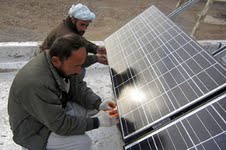I’ve written a lot about climate change and how future development needs to be sustainable and environmentally friendly. It’s easy to talk about these things like there are simple solutions and unlimited funds to develop sustainable products. In reality, however, it’s an extremely difficult process to create a product that is the perfect intersection between functionality, efficiency, and environmental sustainable. But there is hope. In Pakistan and India, for example, there has been a focus on building houses in a sustainable and environmentally friendly way. And now, Nepal and Afghanistan are jumping onboard with the challenge to create innovative and sustainable products as well.
Nepal is one of the poorest countries in the world, and most of the country has no electricity. To cook, the vast majority of families use a stove that consists of an open fire on three bricks that are packed with mud. This takes place indoors – typically in a small one or two room home – and results in the entire house filling up with smoke.
This method of cooking is not only bad for the environment, as the stoves emit greenhouse gases and require large quantities of firewood, but is also a severe health hazard for those who are exposed to the smoke. It is a common cause of widespread respiratory problems, such as asthma and death by asphyxiation – or suffocation. In fact, a study in 2008 by Nepal’s Alternative Energy Promotion Center (AEPC) determined that indoor air pollution – largely by these cooking stoves – was the fourth biggest risk factor for the population, after only malnutrition, unprotected sex, and unsafe water. It was also reported that more than 80% of Nepal is exposed to this pollution and is at risk for suffering the dangerous consequences.
Fortunately, the nation is doing something about it. The government made the creation of improved cooking stoves (ICS) a priority in their plans to improve Nepal, and in 1999, more than $5 million was invested in designing, building, and implementing these stoves in homes across the country. Currently, almost 500,000 cooking stoves have been replaced by AEPC with new, innovative stoves that pose no health hazards and drastically reduce greenhouse gas emissions. Even better, AEPC is focusing on implementing the stoves in a sustainable way. They train at least three people in each village to make and use the ICS – and two of them have to be women. In other words, AEPC’s overall strategy accomplishes three extremely important things: saving lives, saving the environment, and empowering women.
Nepal isn’t the only one making cooking more sustainable. Afghanistan, too, is working to create practical and sustainable cooking practices. One of their main focuses has been to introduce the utilization of solar energy into their stoves in order to keep costs down and improve the air quality. Like Nepal, the overwhelming majority of Afghans don’t have access to electricity – and even if they did, many couldn’t afford it. Solar energy is therefore an excellent option. One organization that has already been supplying Village Sun Ovens – which are solar energy stoves – in Afghanistan is the Temple Solar Project. Because of their practicality, efficiency, and low cost, solar energy stoves are quickly becoming more popular and in greater demand. Hopefully, Afghanistan and Nepal will continue to invest and work at creating the ideal solar energy stove, and will pave the road for the rest of the world to follow.
been to introduce the utilization of solar energy into their stoves in order to keep costs down and improve the air quality. Like Nepal, the overwhelming majority of Afghans don’t have access to electricity – and even if they did, many couldn’t afford it. Solar energy is therefore an excellent option. One organization that has already been supplying Village Sun Ovens – which are solar energy stoves – in Afghanistan is the Temple Solar Project. Because of their practicality, efficiency, and low cost, solar energy stoves are quickly becoming more popular and in greater demand. Hopefully, Afghanistan and Nepal will continue to invest and work at creating the ideal solar energy stove, and will pave the road for the rest of the world to follow.
It’s important to acknowledge the difficulty of creating these stoves and other sustainable, environmentally friendly products. Nepal and Afghanistan should definitely be praised for their determination to not only improve the lives of their people, but help save the environment as well. It’s truly inspiring and encouraging for the entire global community that there really is a way to develop sustainable products that are inexpensive, efficient, and effective.
Rebecca Birnbaum is a Program and Research Intern with the SISGI Group focusing on nonviolent conflict resolution, nonprofit management, and sustainable development. She is a senior at the University of Michigan, where she studies Anthropology, Political Science, and Peace and Social Justice. To learn more about the SISGI Group, visit www.sisgigroup.org.

